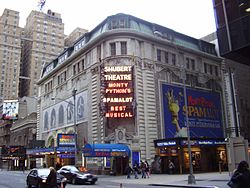 | |
 | |
| Address | 225 West 44th Street Manhattan, New York City United States |
|---|---|
| Coordinates | 40°45′29″N 73°59′14″W / 40.75806°N 73.98722°W |
| Public transit | Subway: Times Square–42nd Street/Port Authority Bus Terminal |
| Owner | Shubert and Booth Theatre, LLC |
| Operator | The Shubert Organization |
| Type | Broadway |
| Capacity | 1,502[1] |
| Production | Hell's Kitchen |
| Construction | |
| Opened | October 2, 1913 |
| Architect | Henry Beaumont Herts |
| Website | |
| Official website | |
| Designated | December 15, 1987[2] |
| Reference no. | 1378[2] |
| Designated entity | Facade |
| Designated | December 15, 1987[3] |
| Reference no. | 1379[3] |
| Designated entity | Lobby and auditorium interior |
The Shubert Theatre is a Broadway theater at 225 West 44th Street in the Theater District of Midtown Manhattan in New York City. Opened in 1913, the theater was designed by Henry Beaumont Herts in the Italian Renaissance style and was built for the Shubert brothers. Lee and J. J. Shubert had named the theater in memory of their brother Sam S. Shubert, who died in an accident several years before the theater's opening. It has 1,502 seats across three levels and is operated by The Shubert Organization. The facade and interior are New York City landmarks.
The Shubert's facade is made of brick and terracotta, with sgraffito decorations designed in stucco. Three arches face south onto 44th Street, and a curved corner faces east toward Broadway. To the east, the Shubert Alley facade includes doors to the lobby and the stage house. The auditorium contains an orchestra level, two balconies, and a flat ceiling. The space is decorated with mythological murals throughout. Near the front of the auditorium, flanking the elliptical proscenium arch, are box seats at balcony level. The upper levels contain offices formerly occupied by the Shubert brothers, and the stage house to the north is shared with the Booth Theatre.
The Shubert brothers developed the Booth and Shubert theaters as their first venues on the block. The Shubert Theatre opened on October 2, 1913, with a revival of Hamlet. The theater has hosted numerous long-running musicals throughout its history, such as Bells Are Ringing and Promises, Promises. Since the 1970s, the Shubert has hosted relatively few shows, including long runs of the musicals A Chorus Line, Crazy for You, Chicago, Spamalot, Memphis, and Matilda the Musical.
- ^ Cite error: The named reference
Shubert Organization Shubertwas invoked but never defined (see the help page). - ^ a b Landmarks Preservation Commission 1987, p. 1.
- ^ a b Landmarks Preservation Commission Interior 1987, p. 1.